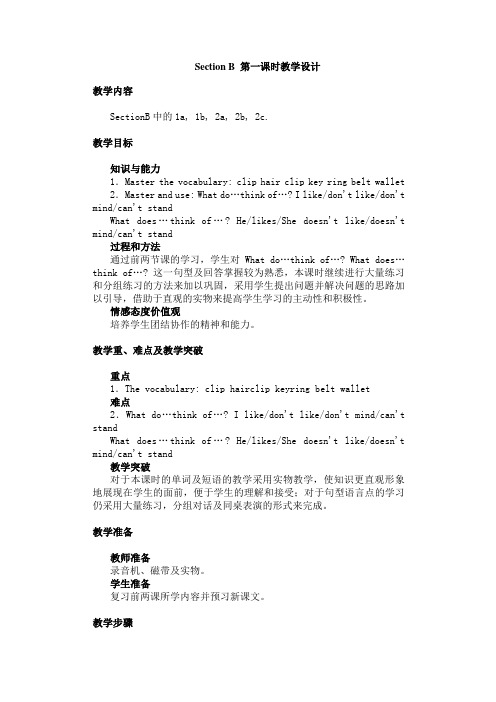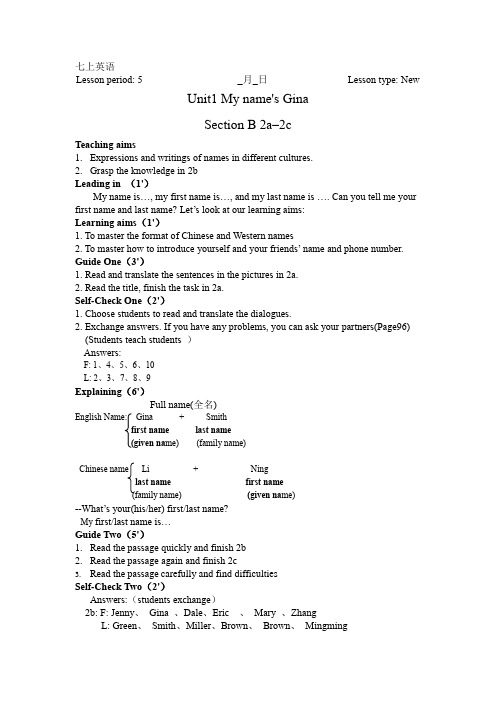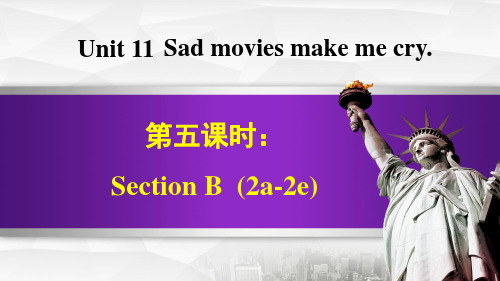Unit11 Section B 2a-2c
Unit10 Section B(2a-2c) 人教版七年级英语下册

Learning Goals
学习目标
In this class, you will: 1. 掌握知识点around the world, answer, the
number of , age, make a wish , blow out the candles, cut up, idea及if条件状语从句的用法 。 2. 熟读、翻译、背诵2b文章. 3. 通过课堂活动提高阅读能力. 4. 了解中外生日饮食传统.
在许多国家,人们吃插着蜡烛的生日蛋糕。
The number of candles is the person’s age. 蜡烛的数量是过生日的人的年龄。
后置定语
The birthday person must make a wish and blow out the
candles. 过生日的人必须许个愿望并吹灭蜡烛。
Unit 10 I’d like some noodles.
Section B 2a~2c
What do you eat on your birthday?
cake 蛋糕 candle 蜡烛
a birthday cake with candles
long noodles 长寿面
eggs
What do you do on your birthday?
make a wish 许愿
blow out the candles 吹灭蜡烛
On our birthday, we usually do the following things:
make a wish, blow out the candles, have a party, sing and dance, get gifts(礼物)
七年级英语人教版 unit 11 Section B 第一课时教学设计

Section B 第一课时教学设计教学内容SectionB中的1a, 1b, 2a, 2b, 2c.教学目标知识与能力1.Master the vocabulary: clip hair clip key ring belt wallet 2.Master and use: What do…think of…? I like/don't like/don't mind/can't standWhat does…think of…? He/likes/She doesn't like/doesn't mind/can't stand过程和方法通过前两节课的学习,学生对What do…think of…? What does…think of…? 这一句型及回答掌握较为熟悉,本课时继续进行大量练习和分组练习的方法来加以巩固,采用学生提出问题并解决问题的思路加以引导,借助于直观的实物来提高学生学习的主动性和积极性。
情感态度价值观培养学生团结协作的精神和能力。
教学重、难点及教学突破重点1.The vocabulary: clip hairclip keyring belt wallet难点2.What do…think of…? I like/don't like/don't mind/can't standWhat does…think of…? He/likes/She doesn't like/doesn't mind/can't stand教学突破对于本课时的单词及短语的教学采用实物教学,使知识更直观形象地展现在学生的面前,便于学生的理解和接受;对于句型语言点的学习仍采用大量练习,分组对话及同桌表演的形式来完成。
教学准备教师准备录音机、磁带及实物。
学生准备复习前两课所学内容并预习新课文。
教学步骤本课小结本节课学习了5个生词和What do/does…think of…? 及回答句式的练习运用,通过本节课的学习,学生进一步巩固了本单元所学知识。
Unit 1 Section B(2a-2c)教案2022-2023学年人教版英语七年级上册

七上英语Lesson period: 5 _月_日Lesson type: NewUnit1 My name's GinaSection B 2a–2cTeaching aims1.Expressions and writings of names in different cultures.2.Grasp the knowledge in 2bLeading in (1')My name is…, my first name is…, and my last name is …. Can you tell me your first name and last name? Let’s look at our learning aims:Learning aims(1')1. To master the format of Chinese and Western names2. To master how to introduce yourself and your friends’ name and phone number. Guide One(3')1. Read and translate the sentences in the pictures in 2a.2. Read the title, finish the task in 2a.Self-Check One(2')1. Choose students to read and translate the dialogues.2. Exchange answers. If you have any problems, you can ask your partners(Page96) (Students teach students )Answers:F: 1、4、5、6、10L: 2、3、7、8、9Explaining(6')Full name(全名)English Name: Gina + Smithfirst name last name(given na me) (family name)Chinese name Li + Ninglast name first name(family name) (given na me)--What’s your(his/her) first/last name?--My first/last name is…Guide Two(5')1.Read the passage quickly and finish 2b2.Read the passage again and finish 2c3.Read the passage carefully and find difficultiesSelf-Check Two(2')Answers:(students exchange)2b: F: Jenny、Gina 、Dale、Eric 、Mary 、ZhangL: Green、Smith、Miller、Brown、Brown、Mingming2c: FriendsJenny Green and Gina SmithDale Miller and Eric BrownMary Brown and Zhang MingmingExplaining(1')in+China (国家名首字母大写)Guide Three(4')Read the passage aloud, find the sentence structureSelf-Check Three(3')1. Show chinese meaning in 2b on the screen,let some students say in English2. Ask some students to summarize sentence structure3. Fast students try to reciteSummary(1')1. the format of Chinese and Western names2. 4 sentencesBlackboard DesignUnit1 My name's GinaSection B 2a–2cFull name(全名)1、English Name: Gina + Smithfirst name last name(given na me) (family name)Chinese name Li + Ninglast name first name(family name) (given na me)2、in+China (国家名首字母大写)Test(10')练习册P10Ⅰ-ⅣIntrospection。
2021春人教版九年级英语下册 Unit 11 Unit 11 SectionB (2a-2e)

the school soccer field.
考点3 stop doing sth. 停止做某事 e.g. When he saw me, he stopped working. 当他看到我时他停止了工作。
考向 辨析:alone 与lonely
alone
作adj. 指客观上独自一人。 作adv. 常修饰动词或动词短语。
lonely
作adj. 指情感上的孤独。固定搭配 feel lonely 感到孤独。
e.g. My parents went to work so I was alone at home. 我父母去上班了,因此我独自一人在家。 He enjoys working alone. 他喜欢独自工作。 No one played with him and he felt lonely. 没有人和他玩,他感到孤独。
4. What happened after Peter told his teammates that he was sorry? To his surprise and relief, his teammates all nodded in agreement.
5. Why did Peter think that he was on a winning team even though they lost the last game? Because his teammates said, “Don't worry about it. It's never just one person’s fault. We should think about how we can do better next time.”
人教版新目标九年级英语 Unit 11 Section B (2a-2e) 同步测试(有答案)

人教版新目标九年级英语Unit 11Section B (2a-2e) 同步测试一、单项选择( ) 1.No one went hiking last weekend ________the bad weather.A.instead of B.becauseC.because of D.than( ) 2._________ you do,don't miss this exhibition,for it's so hard for me to get the tickets. A.Whatever B.HoweverC.Whenever D.Whether( ) 3.The girl doesn't want to ________her parents________,so she works harder than before. A.make,happy B.let,downC.let,glad D.put,up( ) 4.—Can you hear someone _________songs in the classroom?—It is Mary.A.sing B.singsC.singing D.sang( ) 5.He speaks ________ English ________ French.He speaks German,instead.A.either;or B.not only;but alsoC.both;and D.neither;nor( ) 6.Sandy would rather _______ the train to that city than ________ there by plane. A.take;going B.takes;goC.taking;going D.take;go( ) 7.To my _______,they weren't surprised at the _______news.A.surprised;surprising B.surprise;surprisingC.surprise;surprised D.surprising;surprised( ) 8.His teammate suddenly fell down when he was so close to _______ to the finishing line. A.get B.gets C.got D.getting( ) 9.They rode their bikes _______ the village happily.A.over B.across C.through D.below( ) 10.We should think about _______ we can do it better next time.A.how B.what C.when D.why( ) 11.—Who else do you know at the party ______ Jim and Tom?—Lucy and Lily.A.in B.nextC.among D.besides( ) 12.The two cities have reached an _______ to develop science and technology! A.education B.excitementC.agreement D.invention( ) 13.Little Tom is a naughty boy.He often _______his deskmate.A.is angry withB.pays attention toC.gets into a fight withD.makes friends with( ) 14.Jane is a shy girl. She doesn't have the _______to speak to strangers. A.chance B.thoughtC.courage D.decision( ) 15.The old man prefers to ________ at home rather than ________ to have a picnic. A.staying;going B.stay;goingC.stay;go D.staying;go二、词汇运用A)根据句意及汉语提示填写单词。
Unit1 Section B 2a-2c 22-23学年人教版英语七年级下册

2a Answer the questions.
1. What can Perter do? A. speak English B. play basketball C. play chess D. play the guitar 2.What club is Alan in? A. a sports club B. the English club C. the music club D. the art club 3. What does Ma Huan like to do? S_h_e__li_k_e_s_t_o_t_a_l_k_a_n_d__p_l_a_y_g_a_m__e_s_w_i_t_h_p_e_o_p_l_e_.
Peter can _h_e_lp__w_i_th__s_p_o_r_ts__in__E_n_g_l_is_h__
C
because he can _p_l_a_y_b_a_s_k_e_t_b_a_ll__a_n_d___
_s_o_c_ce_r_, he can also _s_p_e_a_k__E_n_g_l_is_h__ .
We need help at the old people’s home. Mr. Brown at 293-7742.
Are you free in July? Are you good
with old people? Can you talk to them (
B
)
and play games with them? They can Can you play the piano or the
Alan can _b_e__a_m__u_s_ic__te_a_c_h_e_r__ because
Unit11_Sad_movies_make_me_cry.2a-2c
+ +
宾 宾 语 语
宾语补 足语
his inventiom has make him famous
他的发明已使他成名了。
The color red makes me nervous. 。
红色会使我紧张
宾语补足语为动词的情况
常 常 用 用 结 结 构 构
make make make make make make
makes me want to have a holiday.
The delicious food hungry makes me______.
makes me want to eat.
2a Listen and number the pictures [1-4] in the order you hear them.
A friend is a gift you give yourself. 朋友是你给自己最好的礼物。
+ +
宾 宾 语 语
宾语补 足语
Scientists are working hard to make our dream ________(come) true
他科学家正在努力工作以便能 使得我们的梦想实现。
— You look sotired. — B. to My mother makes me ____ A. practice practice C. Practicing playing the piano for 2 A. practice hours every day.
4. The more I got to know Julie, the more I’ve realized that we have a lot in common. the+比较级+从句 ,the +比较级+从句 “越……, 越……” e.g. The more you exercise, the healthier you will be. 你锻炼的越多,身体就越健康。
Unit 11 第4课时 Section B(2a-2e)【课件】九年级英语全一册(人教版)
only half the game. The other half is learning how to communicate with your
teammates and learning from your mistakes.”
动名词作主语
Peter didn’t say anything, but what his father said made him think carefully.
4. What happened after Peter told his teammates that he was sorry?
His teammates asked him not to worry about what had happened as it wasn’t just one person’s fault. They agreed that they should work together to think about how they could do better in the future.
2c
Read the story again and answer the questions.
3. Do you agree with Peter’s father? Why or why not?
Yes. Because soccer is about team effort. It is more meaningful to learn from one’s mistakes and do better in the future.
Unit 11
Sad movies make me cry
SectionB (2a-2e)
Unit 9 Section B(2a-2c)七年级上册英语教学课件(人教版)
Read the passage fast and answer the questions.
1. When is Yu Mei’s lunch time? From 12:00 to 1:00.
2. Who is her Chinese teacher? Mrs. Wang.
3. What does she think of her Chinese teacher? She is great fun.
Time 8:00 to 8:50 9:00 to 9:50 10:00 to 10:50 11:00 to 11:50
My Friday
Subjects/ Activities
Time 12:00 to1:00
Subjects/ Activities
1:00 to 1:50
I am very busy on
4. My classes finish at 1:50, but after that I have an art lesson
A: What’s your favorite subject?
B: My favorite subject is… boring
A: Why do you like …?
B: Because it’s…
Chinese
politics
interesting
English history
math geography
3. Our Chinese teacher, Mrs. Wang, is great fun. fun n.有趣的事物(人)
fun作不可数名词,意为“有趣的事物(人)”,在本句中,表 示“有意思的人; 逗人开心的人; 有趣的人”。在这种用法中, fun 前面可有great/good等词修饰。
Unit11 Section A(2a~2c) 人教版七年级英语下册
A. anything special
B. something special
C. special anything
D. special something
【点拨】用语法分析法解题。something 用于肯定句或表 示请求、建议或征求意见的疑问句中; anything 用于疑问句 或否定句中。本题问句是一般疑问句, 不表示请求、建议 或征求意见。修饰不定代词的形容词要位于不定代词之后。
/d/
卡罗尔:我们看到了很多有趣的事情,
我们从他那里学到了很多关于农业的知识。
Bo鲍b:勃Th:ata太’sskg好的re了过at!!去D你式id问yo过u 他ask什h么img问raon题wy的吗qu过?es去tio式ns?
Carol: Yes. I asked him if the farmers grew strawberries.
④ Did you learn anything useful in this book? (any useful things) 你在这本书中学到了什么有用的东西吗?
中考在线:
—Helen, did you do ____A____ last weekend?
—Yes, I visited my grandparents in the countryside.
Carol: Yes, they do. They pick the apples around September. 是的。他们在大约九月摘苹果。
Bob: D你id摘y草ou莓pi了ck吗an?y strtaawkeb的err过ie去s? 式 Carol: Y是e的s, w。e我di们d.也An带d 了we一t/o些ʊo/k回s家om!e home, too! Bob: Oh, wow! Were they good?
- 1、下载文档前请自行甄别文档内容的完整性,平台不提供额外的编辑、内容补充、找答案等附加服务。
- 2、"仅部分预览"的文档,不可在线预览部分如存在完整性等问题,可反馈申请退款(可完整预览的文档不适用该条件!)。
- 3、如文档侵犯您的权益,请联系客服反馈,我们会尽快为您处理(人工客服工作时间:9:00-18:30)。
____ √ interesting ____ √ lovely ____ × difficult ____ × slow ____ √ exciting ____ √ lucky ____ √ delicious ____ √ cool × boring ____ ____ √ great ____ hot ____ √ large ____ × expensive ____ × terrible ____ cheap ____ fast
规则动词过去时的变化规则:
1
•
一般情况下, 在动词原形末尾加-ed ; needed
played worked wanted • 结尾是不发音字母-e 的动词加-d 2
hoped lived used 3• 结尾是“辅音字母+y” 的动词,变y 为i -ed; • study—studied worry—worried
把下列句子变成否定句,一般疑问句,பைடு நூலகம்否回答及对划线部分提问
1.The air was clean yesterday. The air wasn't clean yesterday. Was the air clean yesterday? Yes, it was./ No,it wasn't. How was the air yesterday?
2a
Do the following words describe good things or bad things? Put a√ for good and an ×for bad. Leave a blank if they can mean both.
2a
___ interesting ___ difficult ___ lovely ___ slow ___ exciting ___ boring ___ cool ___ hot ___ lucky ___ large___ expensive __ terrible ___delicious ___ great ___ cheap ___ fast
takes some photos took some photos
goes fishing
went fishing
What do theydo every day? They..... go for a walk
What did theydo last week? They.....
went for a walk
milk a cow
go for a walk
ride a horse
pick
strawberries
talk with/to farmers/a farmer
feed chickens
take photos take a photo take some photos
visit my grandparents
再加
• 重读闭音节结尾,双写动词尾辅音字母再加- ed 4 • • stop—stopped shop—shopped
写出下列动词的过去式: • go— went have/has— had see— saw • eat— ate buy— bought take— took ride— rode feed— fed bring---brought • is/am- wasare--- were come--- came buy--- bought cut--- cut do/does--did • draw--- drew drive--- drove feel--felt • fight--find--fly--fought found flew forget--get--grow--forgot got grew hear--keep--know---
如果陈述句中的动词为实义动词,变成疑问 句时,要用助动词do的过去式did帮助构成, 这时后面的谓语动词要变成动词原形。 如:I rode a horse last summer . • 改为一般疑问句: • Did you ride a horse last summer ? • Yes, I did. / No, I didn’t.
heard
kept
knew
leave--- left make--- made put--- put run--- run sell---sold sleep--- slept stand--- stood teach--- taught wear--- wore
let--- let lose--- lost meet--- met pay--- paid read---read ride--- rode say--- said see--- saw sing--- sang sit--- sat speak--- spoke spend--spen swim--- swam take--- took tell--- told think--- thought write--- wrote
3.There was a bird in the tree just now. There wasn't a bird in the tree just now. Was there a bird in the tree just now? Yes, there was. No,there wasn't. What was in the tree just now?
2a Do the following words describe good things or bad things? Put a √ for good and an × for bad. Leave a blank if they can mean both. ___ √ interesting ___ √ lovely × difficult ___ ___ ___ √ exciting ___ × slow × boring ___ ___ ___ √ √ cool √ lucky × hot ___ ___ √ large × expensive ___ × terrible ___ ___ × cheap √ delicious ___ √ great √ ___ √ ×fast
Language points (语言点) • 1. 词汇: • 1) 名词n. robot, guide, gift 2) 形容词adj. lovely, expensive, exciting, cheap, slow, fast, interested, dark • 3) 动词 v. hear • 4)代词 pron. everything 5)短语 be interested in … • 2. 句型:It was a great day. • I didn’t … because …
What did you do last weekend?
watched TV
played soccer
What did you do last weekend?
(go )went to the beach cleaned the room play ed the computer games
What did you/he/she/they do last weekend?
feed chickens
milk a cow
milked a cow
ride a horse
rode a horse
What does he/she What did he/she do every day? do yesterday? He /She.... watches the stars watched the stars
否定句:句中有were或was在构成否定句时, 在was 或were 后面加 not
You weren’t at school yesterday.(否定句)
疑问句:构成疑问句时,把 were或was放在 主语前面,句尾加问号; 肯定回答和否定回 答时态要与问句中的时态一致
---Were you at school yesterday?(一般疑问句) ---Yes, I was. ---No, I wasn’t.
2.Tom and Peter were at home last night. Tom and Peter weren't at home last night. Were Tom and Peter at home last night? Yes, they were./No.they weren't. Where were Tom and Peter last night.
4.I rode a horse last Sunday. I didn't ride a horse last Sunday. Did you ride a horse last Sunday? Yes,I did./No,I didn't. What did you do last Sunday?
watch flowers
watched flowers
pick strawberries picked strawberries
一般过去时
一般过去时:表示发生在过去的事情 构成:主语+动词过去式+其他 标志:1:句中有过去的时间如:yesterday, last week, in 2008, two days ago等 Carol took some photos last Sunday. 2:根据上下文 It was rainy yesterday. We stayed at home.
studied for the test
went to the mountains
